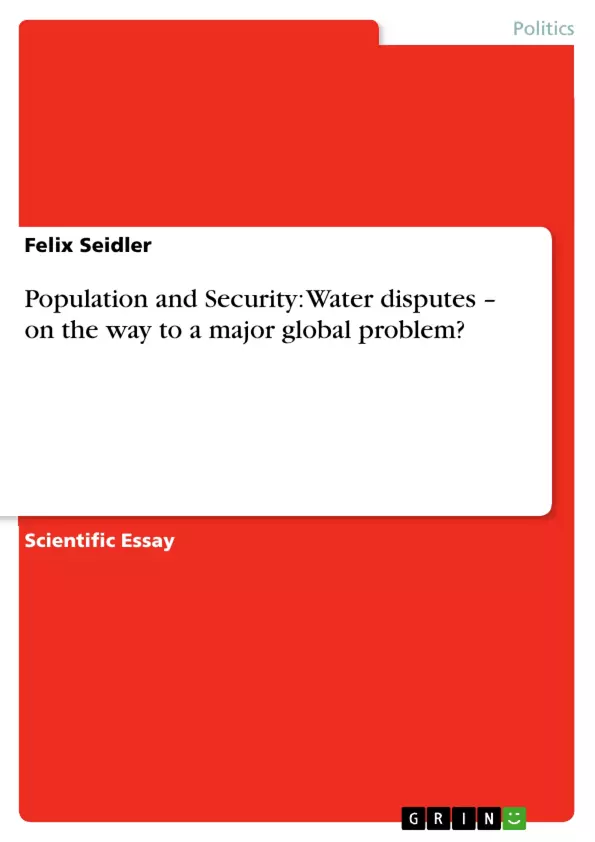Water is the base of all human existence. First of all for drinking, food production and hygiene, but also for all other developments of contemporaries’ human society. The United Nations has estimated world population would grow from 6 to 9,3 billion between 50 years and beside this “people are getting wealthier” . Thus can be no doubt of a rising global demand for freshwater, but climate change and other environmental factors will lead to short run of water in certain regions. In consequence water can be predicted to become a security issue and a reason for conflict, as it even may be today in some regions.
Only 2,5% of all water on the earth is freshwater. 70% of this freshwater is frozen at North and South Pole, 29% are bonded not accessible for mankind as “soil moisture” and in “underground aquifers” . About 1% (0,007% of all water) is useable for mankind, but “water is renewable resource” . This numbers underline the importance of the question, if it is possible supplying all humans with enough water or if water may lead to conflict.
Chapter 2 will discuss the questions of waters potential as a reason for dispute, conflict or peaceful development. Dispute is to understand as a political issue while conflict could further mean use of other elements than political including force. Connected to this Chapter 3 will analyse how water disputes and fertility, mortality and migration relate to each other. This is important because developments of the last three factors are highly dependent on fresh water accessibility. As examples for today’s water disputes two case studies on Israel/Jordan/Syria/Lebanon and Turkey/Syria/Iraq will be made.
Even if such an answer is difficult to make, chapter 5 will try to answer the main question if water will become a major security problem in the 21st century and if water disputes will lead to conflicts. In context of population growth and climate change this will be an important topic for 21st centuries politics.
The terms `conflict´ or `major conflict´ do necessarily contain war or violence. Water disputes could possibly lead to violent conflict, but when the term `conflict´ is used here it means conflict in general and not specifically war or violence.
Inhaltsverzeichnis (Table of Contents in English)
- Introduction
- Potentials of water for conflict and peace
- Conflict potential
- Peace potential
- Effects between water disputes and fertility, mortality and migration.
- Current water disputes – Lebanon/Syria/Jordan/Israel and Turkey/Syria/Iraq
- Lebanon/Syria/Jordan/Israel
Zielsetzung und Themenschwerpunkte (Objectives and Key Themes in English)
This work explores the potential for water to become a major security issue and the reason for conflict, particularly in the context of rising global freshwater demand, population growth, and climate change.- The relationship between water disputes and conflict, including potential for cooperation and peace
- The interconnectedness of water disputes with demographic factors such as fertility, mortality, and migration
- The impact of climate change on water availability and security
- Case studies of water disputes in the Middle East, focusing on the regions of Lebanon/Syria/Jordan/Israel and Turkey/Syria/Iraq
- The role of international agreements and organizations in managing transboundary water resources
Zusammenfassung der Kapitel (Chapter Summaries in English)
The introductory chapter sets the stage for the discussion by outlining the critical role of water in human existence and highlighting the growing global demand for freshwater. The chapter also introduces the potential for water to become a source of conflict, given the factors of population growth and climate change. Chapter 2 delves into the complex relationship between water and conflict, exploring the various dimensions of conflict that can arise from water scarcity and mismanagement. The chapter also examines the potential for water to be a source of cooperation and peace. Chapter 3 examines the interconnections between water disputes and demographic trends, particularly in the context of fertility, mortality, and migration. The chapter explores how water scarcity and abundance can influence population dynamics and contribute to security concerns. Chapter 4 presents two case studies of current water disputes in the Middle East, focusing on the regions of Lebanon/Syria/Jordan/Israel and Turkey/Syria/Iraq. The chapter highlights the complexities and challenges of managing water resources in a region marked by historical conflict and geopolitical tensions.Schlüsselwörter (Keywords in English)
The work explores the crucial issues of water scarcity, transboundary water resources, conflict resolution, climate change, population dynamics, demographic trends, and international water agreements. The case studies focus on the Middle East, examining the role of water in political and social dynamics in the regions of Lebanon/Syria/Jordan/Israel and Turkey/Syria/Iraq.Frequently Asked Questions
Will water become a major security problem in the 21st century?
The research suggests that with rising global demand and climate change, water is increasingly becoming a security issue and a potential source of conflict.
How much of the Earth's water is usable freshwater?
Only about 1% (or 0.007% of all water on Earth) is accessible and usable freshwater for mankind.
What are the case studies mentioned in the paper?
The paper analyzes water disputes in the Middle East, specifically between Israel/Jordan/Syria/Lebanon and Turkey/Syria/Iraq.
How do water disputes relate to migration?
Water scarcity can lead to increased mortality, reduced fertility, and forced migration as people seek areas with better access to freshwater resources.
Can water be a source of peace instead of conflict?
Yes, the paper discusses the "peace potential" of water, where shared resources can lead to international cooperation and political agreements.
- Citation du texte
- Felix Seidler (Auteur), 2009, Population and Security: Water disputes – on the way to a major global problem?, Munich, GRIN Verlag, https://www.grin.com/document/137602



